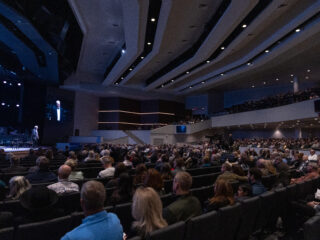The old preachers tell a story about an acrobat who was pushing a wheelbarrow while walking on a tight rope across a raging waterfall. He would walk across, and the crowd would cheer. He would return, and the crowd would cheer louder. The acrobat did this several times, and everyone was applauding when he stopped and pointed to a man standing at the front of the crowd.
“Sir, do you believe I can push this wheelbarrow on the tight rope across the waterfall?”
“Sure, I believe you can do it,” the man answered.
“Do you believe I can push this wheelbarrow across and back again?”
The man nodded his head, “Sure, I believe you can do it. I’ve seen you do it.”
The acrobat pointed to the wheelbarrow. “Then, get into the wheelbarrow.”
I’ve been told by friends who’ve had to learn English as a second language that because English has so many words with more than one meaning, English is very hard to learn. Sometimes, you can only tell a word’s meaning from the context of the conversation. If you don’t hear everything else being said, you’ll miss the intended meaning of the word.
What’s more, the meaning of some words can change over time. Take the word “bad” for example. This word used to have a pretty simple meaning. “Bad” meant the opposite of “good”. If something was “bad” then you didn’t eat it or didn’t do it. However, if you’re from a certain generation, if something is “bad,” it could be really “good.” Or, if someone makes a “bad” play in a ball game, then it’s a “good” play. I know. It gets confusing.
In church, we use the word “belief” a lot. Through confessions, hymns, worship songs, and Scripture readings, we confess our “belief” in God the Father, His Son, Jesus Christ, and the Holy Spirit. We’ll also talk to each other about whether or not we “believe” it will rain later today or if we “believe” our favorite team will win.
We’ll use the word “belief” as a synonym for “think,” “hope,” “wish,” and other words that talk about how we feel or understand what’s going on around us.
But I’m not sure we’ll use the word in the way the New Testament intended. When Peter tells the Pentecost crowd to “believe” in the Lord Jesus, he is saying something stronger than “think” or “wish.” When Paul tells the Philippian jailor to “believe,” he’s talking about something other than what most of us are thinking when we use the word, “believe.”
The original meaning of the word “believe” is to “make your stand on” or “put your weight down on.” It’s the old story of sitting in the chair because you “believe” the chair will bear your weight. In the same way, when we say we “believe” in Jesus, we are saying we’re building our lives on the foundation of the person of Jesus and His teachings. We consciously work to align our choices with His expectations and commandments in our everyday decisions.
I’m not sure most of our church members would see it that way. I’m quite sure that most of those who identify themselves as “Christian” in the United States don’t see it that way. “Christianity” has now become a cultural word meaning someone who adheres to a loosely formed ethical standard known as the “Judeao-Christian ethic.” These “Christians” may or may not have an understanding of the person of Jesus Christ, His life, or His teachings. The radical teachings of Jesus’ message and the expectations of His followers are melted together with other misunderstood religious teachings and secular expectations into our modern-day secular religion of tolerance and manners.
Instead of laying down their lives in submission to Jesus as Lord, too many who claim to follow Him have answered His call with a definite “we’ll see.” Here’s what I mean. Whenever we do the surveys, we find out that there’s no real significant difference when it comes to life choices between Christians and non-Christians.
For example, most Christians will tell you that they are against divorce, but Christians get divorced at the same rate as the culture around them. Most evangelicals will tell you that they are pro-life, but we choose abortion at the same rate as the culture around us.
Why? Because most of us don’t believe. We’ll listen. We’ll agree where we can and we’ll follow as long as it’s comfortable, but if the road gets too hard, the path too narrow, we will justify our disobedience by saying that no one is perfect.
Sure, that will be part of it, but the real reason is we simply don’t believe. We haven’t put our weight down; we haven’t bet our lives on the teachings of Jesus. We aren’t convinced Jesus knows what is best. We don’t think He understands what it means to live in our technology-enhanced, post-modern culture that moves at the speed of light.
Jesus may have been smart for His time, but He probably doesn’t get our world.
So, we don’t believe and the result is devastating. This absence of confidence in Christ and His teachings leaves our churches anemic. This nagging doubt in Jesus and His teachings means our families are unable to withstand the cultural pressure seeking to redefine our basic relationships and lives still imprisoned in the consequences of repeated bad choices.
We end up with a gospel with no power.
Our world won’t be able to believe the gospel of Jesus until they see a church that believes. The church won’t be able to believe until they see you and I believe. When they see the real difference made by Jesus in a real life living in the real world, then, they too will believe.
But first, someone is going to have to get in the wheelbarrow.









